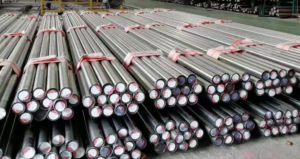Spring steel, as a distinct category of constructional alloy steel, holds a pivotal position in the metallurgical industry. Its primary application lies in the manufacture of springs and elastic components, due to its exceptional elastic properties and resilience under repeated stress cycles. In this article, we will delve into the properties of spring steel, examining its chemical composition, physical characteristics, mechanical properties, and the various factors that contribute to its superior performance.

What are the properties of spring steel?
Firstly, the chemical composition of spring steel is pivotal in determining its properties. The carbon content in spring steel typically ranges from 0.6% to 0.9%, ensuring high elasticity and fatigue resistance. Lower carbon levels may compromise its strength and susceptibility to plastic deformation, while higher carbon contents can affect its machinability and toughness. Apart from carbon, spring steel may also contain alloying elements such as manganese, silicon, chromium, and vanadium, which are added to enhance specific mechanical properties like strength, hardenability, and corrosion resistance.
The physical properties of spring steel are equally noteworthy. Its density, typically ranging between 7.7 and 8.1 grams per cubic centimeter, is indicative of its compactness and weight-bearing capacity. The thermal properties, including the coefficient of thermal expansion, thermal conductivity, and heat capacity, are crucial in understanding the material’s behavior under varying temperature conditions. The low coefficient of thermal expansion ensures stability in shape and dimensions even under thermal stress, while the high thermal conductivity aids in rapid heat dissipation, preventing overheating.
The mechanical properties of spring steel are its most distinguishing features. Elasticity, the ability to return to its original shape after deformation, is paramount in spring steel. High elastic limit and yield strength enable springs to withstand significant loads without permanent deformation. Fatigue resistance, the capacity to endure repeated stress cycles without failure, is another crucial aspect. Spring steel’s ductility and toughness allow it to deform plastically without fracturing, enabling it to absorb and distribute energy effectively. The impact toughness ensures that it can withstand sudden impacts without cracking or breaking.
Furthermore, spring steel exhibits excellent metallurgical quality, including high purity and homogeneity, ensuring consistent performance throughout its lifetime. Strict control over surface quality, minimizing defects and decarburization, is vital to ensure the integrity of the material and its performance in demanding applications. The precision in shape and dimensions is equally critical to ensure proper functioning and longevity of the springs and elastic components.
Heat treatment plays a crucial role in optimizing the mechanical properties of spring steel. Processes like quenching and tempering are used to adjust the microstructure of the steel, enhancing its hardness, strength, and toughness. Annealing can be used to relieve internal stresses and improve machinability, while normalizing helps to refine the grain structure and improve overall mechanical properties.
Specialty spring steel grades are developed to meet specific application requirements. For instance, stainless spring steel offers excellent corrosion resistance for use in harsh environments, while high-temperature spring steel retains its properties even at elevated temperatures. These specialized grades are formulated with precise alloy additions to target specific performance characteristics.
In addition to its mechanical properties, spring steel may also be required to possess certain physical properties for specific applications. For instance, electrical conductivity and magnetic permeability may be crucial in electrical and electronic components. Spring steel used in such applications is formulated and processed to meet these additional requirements.
Conclusion
In conclusion, spring steel is a highly specialized material, possessing a unique combination of properties that make it ideal for use in springs and elastic components. Its chemical composition, physical properties, mechanical properties, and heat treatment processes all contribute to its exceptional performance.
Thank you for reading our article and we hope it can help you to have a better understanding of the properties of spring steel. If you are looking for spring steel suppliers online now, we would advise you to visit Sino Special Metal for more information.
As a leading supplier of spring steels from Shanghai China, Sino Special Metal offers high-quality spring steel products at a very competitive price.




